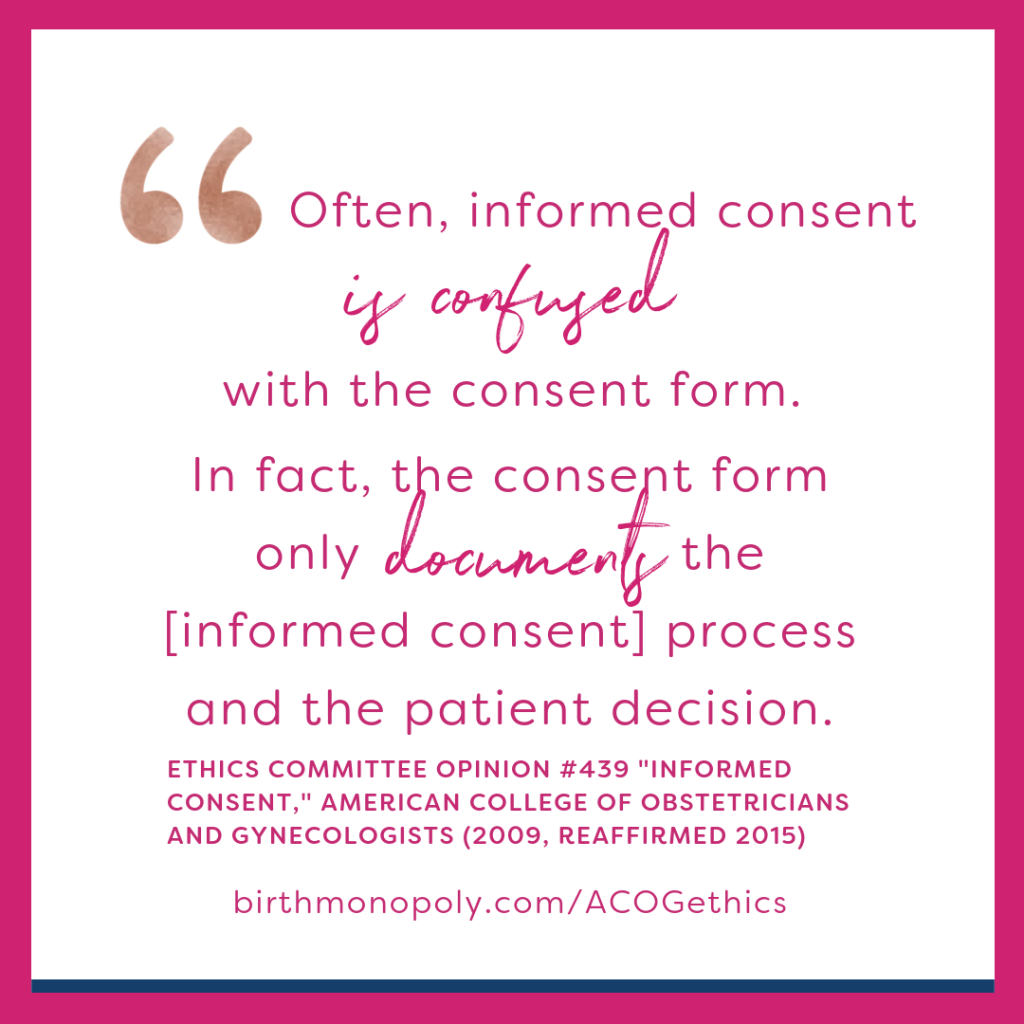I have joked that sometimes when I’m feeling down or discouraged, I sit back and reread committee opinions from the Committee on Ethics for the American College of Obstetricians and Gynecologists (ACOG). But, it’s not entirely a joke; even as alarming reports roll in daily on how people giving birth in the U.S. are treated, it’s uplifting to know that some good eggs at ACOG took the time to articulate their own obligations to support the rights and humanity of the folks in their care.
In addition to perusing these statements recreationally, I often incorporate language from these opinions into my talks and workshops relating to patients’ rights. It is also useful information for anyone looking for insight on the quality of care they themselves or their clients received—or looking to provide their feedback about that care (including making complaints).
Here are four critical opinions for anyone working with pregnant people.
ACOG Committee on Ethics Committee Opinion #439, “Informed Consent” (2009, reaffirmed 2015)
Informed consent is arguably one of the biggest issues in maternity care today. As national health, medical, and advocacy groups express concern about too-high rates of risky procedures like induction and Cesarean, many women are simultaneously telling us that they were not given information or a choice before they had these procedures. True informed consent could make the difference between overuse and judicious use of these interventions; presumably, the person giving birth has the purest motives in the room when it comes to consent or refusal of major medical procedures.
There is so much “good” in this statement on informed consent, it’s impossible to select just one or two quotes. Take a few minutes to read the opinion yourself. Here are a few juicy tidbits:
- “Informed consent should be looked on as a process rather than a signature on a form.”
- “Seeking informed consent expresses respect for the patient as a person; it particularly respects a patient’s moral right to bodily integrity, to self-determination regarding sexuality and reproductive capacities, and to support of the patient’s freedom to make decisions within caring relationships.”
- “Informed consent not only ensures the protection of the patient against unwanted medical treatment, but it also makes possible the patient’s active involvement in her medical planning and care.”
- “The existing imbalance of power in this relationship, however, is a reminder to physicians of their greater obligation to ensure and facilitate the informed consent or refusal of each patient.”
ACOG Committee on Ethics Committee Opinion #390, “Ethical Decision Making in Obstetrics and Gynecology” (2007, reaffirmed 2013)
This opinion is a little more complex in that it considers different frameworks for ethical decision making, some of which are not so clear-cut. Ethics can be murky! But it contains one of my favorite passages, one that I’ve quoted to people all across the country:
“Often, informed consent is confused with the consent form. In fact, informed consent is ‘the willing acceptance of a medical intervention by a patient after adequate disclosure by the physician of the nature of the intervention with its risks and benefits and of the alternatives with their risks and benefits’ (27). The consent form only documents the process and the patient decision.”
Conflation of “informed consent” and the “consent form” is extremely common—not just among patients, but among health professionals. I don’t know how many nurses I’ve spoken to who have expressed frustration that in their workplaces, “consenting” patients means getting a signature on a piece of paper. That is a long way from informed consent.
ACOG Committee on Health Care for Underserved Women Committee Opinion #498, “Adult Manifestations of Childhood Sexual Abuse” (2011, reaffirmed 2015)
What we call “trauma-informed care” is such a crucial part of advancing maternity care. Sadly, a big chunk of people giving birth have experienced abuse or sexual trauma, including rape, in their childhoods or as adults. These people are even more vulnerable to the impacts of disrespectful and aggressive maternity care—impacts that reach far into the postpartum period, the ability to parent, and the relationships with babies, partners, and families.
As awareness about trauma-informed care grows, I love seeing this topic addressed head-on by ACOG. This is from the Abstract:
“Many obstetrician-gynecologists knowingly or unknowingly provide care to abuse survivors … Survivors may be less likely to have regular Pap tests and may seek little or no prenatal care. Obstetrician-gynecologists can offer support to abuse survivors by giving them empowering messages, counseling referrals, and empathic care during sensitive examinations.”
One sure-fire solution? Treat all patients as if they are trauma survivors. It costs nothing, it risks nothing, and it benefits all parties when providers incorporate patient empowerment and empathy into care.
ACOG Committee on Ethics Committee Opinion #321, “Maternal Decision Making, Ethics and the Law” (2005)
Warning: I saved this for last because it is so nerd-a-licious. Don’t feel guilty about skimming this part or skipping to the end.
This jam-packed statement focuses on the loaded issue of so-called Maternal-Fetal Conflict, which the committee questions right off the bat, pointing out that “the interests of the pregnant woman and fetus actually converge” the vast majority of the time—contrary to the view of the mother-baby dyad as “paradigmatically adversarial.”
But wait, there’s more: “Beyond its impact on maternal and child health, failure to recognize the interconnectedness of the pregnant woman and fetus has important ethical and legal implications.” The authors go on to note that interventions on fetuses “must be performed through the body of a pregnant woman,” and recognize the pregnant individual as “patient, person, and rights-bearer.” Rights-bearer!
They also quote George Annas, the distinguished Boston University professor, lawyer, and bioethicist, from his editorial originally published in the New England Journal of Medicine: “Before birth, we can obtain access to the fetus only through its mother, and in the absence of her informed consent, can do so only by treating her as a fetal container, a nonperson without rights to bodily integrity.”[i]
It’s amusing that “reject[ing] medical recommendations” is listed as a risky behavior on par with the use of illegal drugs (three of the four cases cited involve alcohol or drugs, while the other case concerns a woman who declined a Cesarean for “big baby”—and then had an uncomplicated vaginal birth), but the authors come down on the right side about it.
Check out Item #2 under the heading “Against Coercive and Punitive Legal Approaches to the Maternal–Fetal Relationship,” which includes not one, but several, of my all-time favorite paragraphs relating to informed consent. And I’ll stop after this, because it really is a mic drop:
“Justice requires that a pregnant woman, like any other individual, retain the basic right to refuse medical intervention, even if the intervention is in the best interest of her fetus.”
In truth, the woman carrying the baby is the last person who will refuse an intervention if it’s in her own baby’s best interest. But, considering how insecure the right is to refuse any intervention (best interest or not) in pregnancy and birth, it’s good to see such an unequivocal statement about this most basic principle.
The Reality of These Ideals
These opinions feel like a warm bath compared to hard-hitting reality, where we hear daily from women who were not treated as respected, rights-bearing, autonomous individuals in their maternity care. As I wrote in the Statement of Interest for the legal brief submitted on behalf of New York mother Rinat Dray (and primarily authored by human rights lawyer Hermine Hayes-Klein), these alarming issues are systemic and widespread in maternity care. (Read the brief in full here.) When an on-call doctor expressed a preference for surgical birth contrary to the decision by Ms. Dray and her own doctor to plan a vaginal birth (her doctor was, unfortunately, not present), Ms. Dray was tied down and forced to endure a repeat Cesarean. Multiple advocacy and consumer groups support her today not because her case is so extreme, but because it is so common.
May we all find some encouragement in the ideals espoused by our national obstetricians’ group. And may all of our nation’s obstetricians find their way to practicing more in accordance with the ideals ACOG expresses.
 A former communications strategist at a top public affairs firm in Baltimore, Maryland, Cristen Pascucci is the founder of Birth Monopoly, co-creator of the Exposing the Silence Project, and, since 2012, vice president of the national consumer advocacy organization Improving Birth. In that time, she has run an emergency hotline for women facing threats to their legal rights in childbirth, created a viral consumer campaign to “Break the Silence” on trauma and abuse in childbirth, and helped put the maternity care crisis in national media. Today, she is a leading voice for women giving birth, speaking around the country and consulting privately for consumers and professionals on issues related to birth rights and options.
A former communications strategist at a top public affairs firm in Baltimore, Maryland, Cristen Pascucci is the founder of Birth Monopoly, co-creator of the Exposing the Silence Project, and, since 2012, vice president of the national consumer advocacy organization Improving Birth. In that time, she has run an emergency hotline for women facing threats to their legal rights in childbirth, created a viral consumer campaign to “Break the Silence” on trauma and abuse in childbirth, and helped put the maternity care crisis in national media. Today, she is a leading voice for women giving birth, speaking around the country and consulting privately for consumers and professionals on issues related to birth rights and options.
Consult with Cristen | Resources + more Articles
Free handouts + monthly-ish updates from Birth Monopoly: click here
[i] Annas, GJ. N Engl J Med. 1987 May 7;316(19):1213-4.


